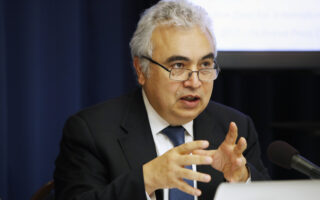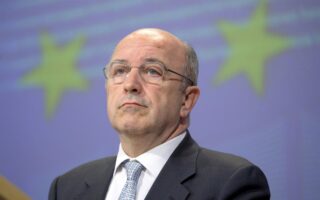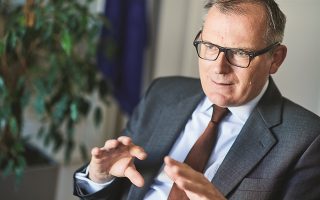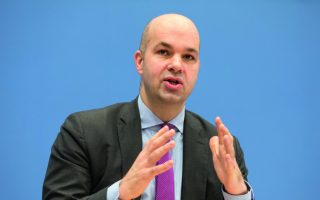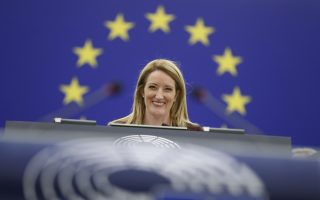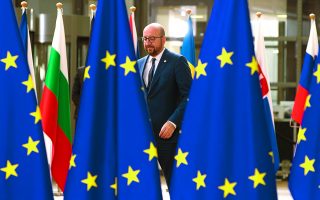Kosovo, the Albanians, the Serbs and Crimea
Prime Minister Albin Kurti talks to Kathimerini about unification plans, Western Balkan challenges and the way forward for Pristina
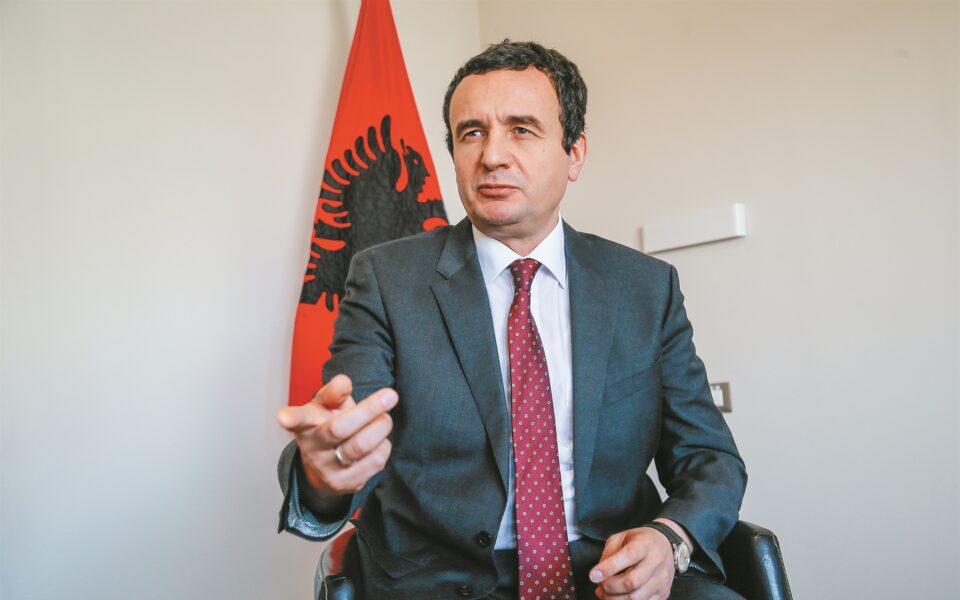
Albin Kurti is a prime minister with an unusual history. The former student activist spent two and a half years in a Serbian prison in 1999-2001, he was jailed again by the authorities of Kosovo in 2007, while in 2018 he was convicted of perpetrating or instigating at least five tear-gas attacks against the Kosovo Parliament, in order to stop the law that would have granted limited autonomy to the Kosovo Serbs.
In his first foray at the Delphi Economic Forum earlier this month, Kurti advocated for the full recognition of Kosovo and its admission into the the European Union and NATO, even without a deal normalizing Serbia-Kosovo relations.
At the same time, he makes no secret of his aspiration to see Kosovo peacefully united with Albania and isn’t worried about potential instability caused by his policies.
In an interview with Kathimerini he repeats the demand for the full recognition of Kosovo by Serbia as a necessary condition for a deal – a demand that Serbs say no Serbian politician could satisfy in the foreseeable future without being chased out of power. His main worry is a potential spillover of the war in Ukraine into the Western Balkans.
– Your political project is that you would like to unify Kosovo and Albania and not give any autonomy to the Serbs of Kosovo. Correct?
I have been prime minister of Kosovo for one year and in this year pensions increased by 11%, disability pensions by 33%. We provided subsidies for new mothers and children and we don’t discriminate according to ethnicity or religion. We want close cooperation with Albania but not to the detriment of minorities. Albania and Kosovo are two different states but not two different nations. The problem is when Belgrade jumps in and wants to undermine our statehood and our institutions. Then it’s natural for us to want to be stronger, because Serbia is much stronger than we are.
– The Brussels Agreement of 2013, which called for the founding of the Community of Serb Municipalities, is not something Belgrade is responsible for, it is something Pristina has agreed to.
There are 33 agreements, Belgrade doesn’t want to implement over two-thirds of them, but is insisting only on this one. When I was in opposition I opposed this because it is not something that the Serbs of Kosovo are demanding.
– You actually stormed the parliament with tear gas in order to stop that from happening…
Yes, we undertook some direct actions against some of the things which have been imposed on us. Not because I am radical by character, but rather according to topic. But for me it was very clear: Kosovo was about to become a new Bosnia, a dysfunctional state. And I really was worried. We got together and we did not allow business as usual. Then, our constitutional court vindicated us. It said that the Community of Serb Municipalities violates the constitution in spirit and in letter. Ιt was always a project from above, never from below. There are no incidents between Albanians and Serbs. Serbia is another issue.
– What makes you think the Serbs of Kosovo would be fine if your vision of unifying Kosovo and Albania went ahead?
In this term in office I was elected prime minister with a ticket of jobs and justice. And I think all Serbs in Kosovo want jobs and justice, I don’t think they oppose me as PM. I have a Serbian minister, Serbs are represented in all the institutions, but Belgrade puts a lot of pressure on them to not be loyal to the Republic of Kosovo. We fight organized crime and corruption like none else in the region. We have arrested 270 state and public officials for corruption this year, this makes our government also more likable to minorities. I am not only the PM of Albanians, I am the PM of all. Kosovo is more and more successful.
– But you want to dissolve it into a larger country.
We want to strengthen our country. The referendum to unify with Albania is not allowed according to our constitution. Our constitution was also internationally arranged, it has an article that does not allow us to join another country. And it’s difficult to change.
‘Albania and Kosovo are two different states but not two different nations. The problem is when Belgrade jumps in and wants to undermine our statehood and our institutions’
– So why do you say you would vote in favor in a referendum for unification?
As I said, we are one nation and it’s impossible for us to forget that the border between Serbia and Albania was imposed on us by Serbia and Yugoslavia. It’s a border which is not ours. And when Serbia attacks Kosovo, we don’t react only as Kosovo, we react as Albanian people, because Serbia has a very close ally in Moscow and is bigger than us, so we react in a way that gets us closer to successful defense.
– My impression from Serbia is that they feel they have lost a lot of precious time with the wars and want to catch up and turn the page and build economic cooperation in the region. Why are you speaking of attacks?
In spring 1999, the Serbian “Operation Horseshoe” expelled 80% of Albanians from their homes. After the war, Operation Horseshoe is just outside of Kosovo in the form of 42 forward-operating bases. In the past, the Kremlin mentioned us once a month, now it is falsely comparing Kosovo and Crimea every other day. In their last, 19th meeting in November, [Serbian President Aleksandar] Vucic and [Russian President Vladimir] Putin spoke about “double standards and hypocrisy in international relations” and Vucic showed Putin the northern part of Kosovo on the map [note: the areas where the Serb minority lives]. Why would he do that? So we are in danger.
– It doesn’t sound like you would put much effort into dialogue. What is your opinion on the efforts for normalization?
I met President Vucic twice in June and July last year. We have had one agreement regarding reciprocity for car plates. I am creative, constructive and committed. I want an agreement. But the agreement must have mutual recognition as a centerpiece. US President Biden and US Secretary of State Blinken are very clear. Officials in Brussels, if you meet them for more than five minutes, say there is no way to bypass independence. Recognition of our independence will be good for Serbia because the next generation will grow up without this hegemonic dream about bringing Kosovo back to Serbia.
– If there is a way to normalize relations and it is being shunned, there is a real chance of problems that could have been avoided. Are you at all concerned about your policies’ impact on regional stability?
With our government there is more peace, security and stability, not less. I will not allow any Serbs of Kosovo to be harmed because of nationality. Our police force is there for everyone. I am telling Belgrade: “Kosovo was lost by the regime of Milosevic. Why don’t you distance yourselves?”
– Can you explain what you said about the analogy between Kosovo and Crimea?
The Russians say that just like NATO liberated Kosovo from Serbia, they are going to liberate as much as they can of Ukraine from Kyiv. When they took over Donbas and Crimea, they wanted to create parallels with Kosovo by saying they had a referendum too. But I saw very clearly that the ballot boxes of those referendums were carried by Russian soldiers. Self-determination and democracy don’t come from above and with an army, but from below and from the people.
– There were a few powerful armies helping you with your self-determination.
But they only bombed with planes, we were the ones who fought on the ground. The case of Crimea and Donbas is for me a clear expression of Russian expansionism and imperialism. They are trying to imitate NATO. They want to create this false analogy.
– Do you think there is a risk of a destabilization of the Balkans due to the war in Ukraine?
I think the Kremlin sees three potential places where it could spread the conflict. Moldova, Georgia and the Western Balkans: Bosnia, Kosovo, Montenegro. In the Western Balkans they could outsource operations to Serbia, while in Georgia and Moldova they would have to allocate power. That’s why I am worried about our region, and particularly our country. In 2012 there were two joint military activities between Serbia and the Russian Federation, in 2016 there were 50, and last year 100.
– But how possible do you think this scenario is?
I really don’t know. I noticed Putin is cutting off his escape routes. That’s why we are worried.
